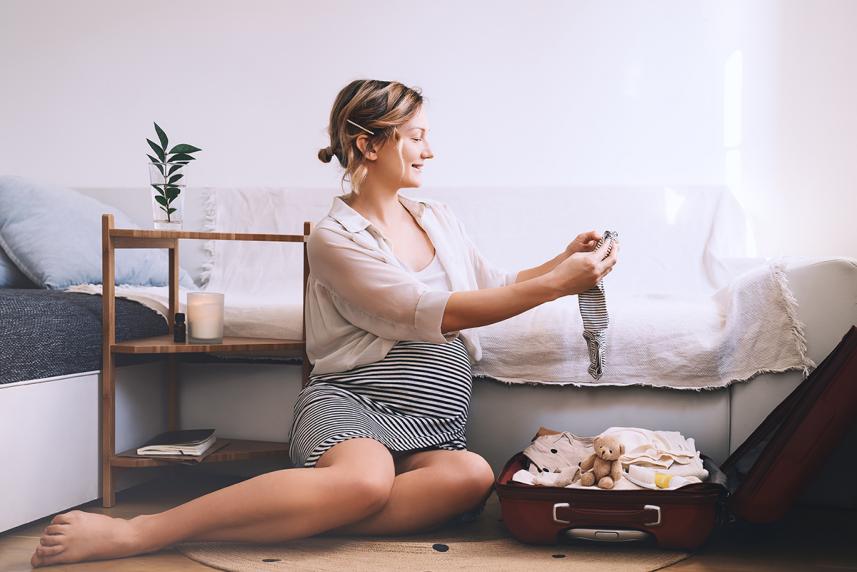Giving Birth? Here’s What to Pack in Your Go Bag
Your no-fuss guide to packing the perfect hospital bag for you, your birth partner, and your new baby.

You’ve bought the newborn essentials, decorated the nursery, and agonized over a baby name. Now it’s time to focus on your “go bag” — the bag of supplies you’ll bring to get you through the birth and hospital stay. While it’s hard to know exactly how long you’ll be at the hospital, most people stay 2 to 3 days after giving birth, says Meagan Haynes, M.D. Dr. Haynes is an Ob-Gyn at Yale New Haven Hospital in New Haven, Connecticut.
And while no 2 hospital bags will be identical, some items are helpful for everyone. Here’s what to consider as you pack for the big day.
What to Pack for the Birthing Parent
The good news is that there’s no need to go overboard, says Dr. Haynes. Remember, you’ll be at a hospital, so the staff should have most essentials on hand. And odds are probably high there’s a drugstore nearby if you need something the nurses can’t offer.
Dr. Haynes recommends these must-haves for the person giving birth:
- ID and insurance card: Your hospital will likely require a photo ID when you check in. It’s also a good idea to keep your insurance card on hand.
- Birth plan: You’ve probably filled out an online version. But you may want to have a paper copy in case your doctors and nurses need to refer to it.
- Socks: Even if you’re sweating during labor, your feet may still feel cold.
- Lip balm: Your lips might get dry during or after the pushing stage of labor.
- Hairbands or elastic ties: If you have long hair, these are essential for keeping hair off your face while in labor.
- Slippers: These can come in handy if you find yourself pacing around the delivery room during labor. Postpartum swelling is also common. That can make slippers more appealing than shoes in the days after giving birth.
- Comfort items: “Birthing is something that’s hard to plan around,” says Dr. Haynes. But some people have an easier time in labor when they use comfort items. Some examples: massage oils, a small speaker for music, or even electric candles. Ask your hospital about whether they provide larger items, such as yoga balls. If they do, that’s one less thing to pack!
- Bathrobe: A bathrobe is easy to slip on and off during labor. It’s also handy for nursing sessions if you plan to breastfeed.
- Postpartum underwear: After giving birth, your uterus will start to shed blood and tissue, called lochia. The hospital will provide you with mesh disposable underwear. But you may want to bring a few comfortable pairs of your own.
- Nursing bra: If you plan to breastfeed, a nursing bra may be more comfortable. Hospitals can typically provide you with a breast pump as well. But if you want a lactation consultant to show you how to use the model you have at home, bring your pump as well.
- A full-size towel: Hospital towels tend to be small. For more privacy, think about bringing your own full-size towel.
- A going-home outfit: Don’t ditch your maternity clothes just yet. It takes about 6 weeks for your uterus to shrink to its pre-pregnancy size, so maternity wear might feel the most comfortable for a while. Plus, if you’ve had a C-section, wearing tight-fitting or high-rise clothing can rub against the abdominal area and irritate the incisions.
- Toiletries: The hospital will give you basics, such as shampoo, toothbrushes, and toothpaste. But if your favorite lotion or conditioner makes you feel more comfortable, it never hurts to bring it.
- A pillow: If a pillow takes up too much space in your hospital bag, you can always stash it in the car and send your partner to retrieve it later.
- A phone charger: The last thing you need is for your mobile phone to run out of power during your hospital stay.
- Entertainment: Labor can be lengthy, especially if you’re being induced. To help pass the time, pack a book, magazine, or a device that allows you to watch movies.
- An extra bag: Hospital staff are often happy to give away personal-care items such as maxi pads and ice packs as well as baby formula to new parents. “I tell all my patients to figure out what works in the hospital and take the extra supplies home with you,” Dr. Haynes says.
(Having a baby? Congratulations! If you need help managing your health and well-being during and after pregnancy, Wellframe is here for you. The digital health management app offers free prenatal and postnatal programs as part of your health plan. Log on or download Wellframe today.)
What to Pack for the Birth Partner
Dr. Haynes recommends packing for the hospital as if you were planning for a 2-day stay at a hotel. On the list:
- Photo ID: The hospital will likely require a photo ID when you check in.
- A pillow and throw blanket: You’ll likely be camping out on a couch, or even just a chair. You’ll want to make yourself as comfortable as possible.
- Phone charger: Tasked with taking photos? Don’t forget your phone charger.
- PJs: Plan on spending 1 to 2 nights in the hospital, depending on whether your partner has a vaginal delivery or a C-section.
- Extra outfits: You’ll probably need 2 outfits. That should cover you during a 2- or 3-day stay in the hospital.
- A full-size towel: Hospital towels can be on the smaller side, so you’ll want to bring your own for the shower.
- Support items for your partner: Whether it’s massage oils, movies, music, or family photos, make sure you have everything you need to help your partner feel as comfortable and empowered as possible during labor.
What to Pack for the Baby
Hospitals are usually stocked with essential baby-care items, such as formula, diapers, wipes, and receiving blankets. So for now, you won’t need to carry a suitcase full of items for your little one. Here are the must-haves for your baby:
- A going-home outfit: Cuteness matters less than comfort and keeping the baby warm. “In general, babies need to wear 1 more layer of clothing than an adult,” says Dr. Haynes.
- Car seat: This is perhaps the most important item you can bring to the hospital. You’ll want to have the base installed in your car ahead of time so you’re not fumbling with straps and manuals at the last minute.
- A pacifier: Some hospitals happily give these out to newborns, and others don’t. You can ask ahead, or pack one just in case.
Having a well-packed hospital bag can help you feel more ready for the big day. But just know that however your birth unfolds, you’ve got this!
(If you want help keeping up with your prenatal appointments or preparing for a new baby, check out Wellframe. This free app comes with your health plan, and it can remind you about upcoming visits and connect you with your care team when you need support. Log on or download the free Wellframe app today.)



